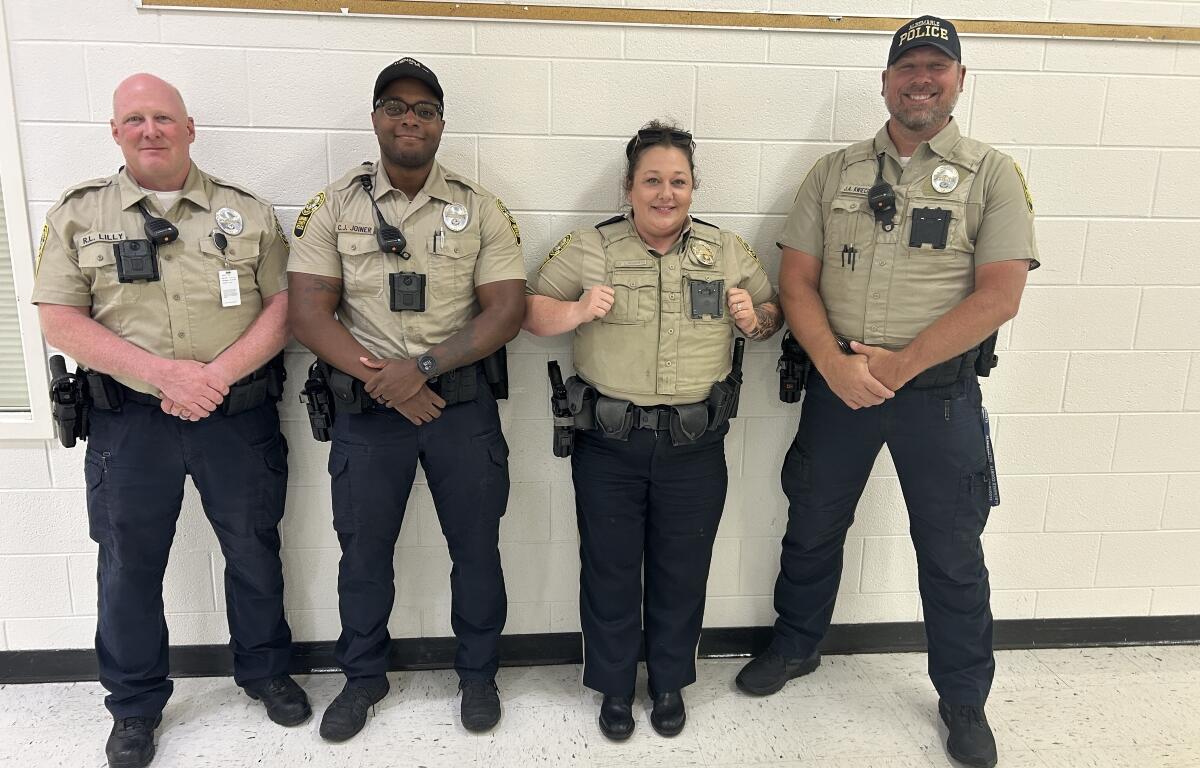CHARLOTTESVILLE, VA (CVILLE RIGHT NOW) – Growing up in New Orleans, Atlanta and then Virginia Beach, Chaka Joiner never had police officers in any of his schools.
Now, as the school resource officer at Monticello High School, Joiner hopes his presence in the building helps students develop a trust and comfort with police officers that he thinks can be mutually beneficial.
“Unfortunately, a lot of people don’t meet with officers of their community until something bad has gone wrong,” Joiner told Cville Right Now. “As an SRO, it gives us the ability to build those relationships so that they can hopefully develop some kind of trust. Even if it’s with one officer, it’s someone in the uniform they feel they can go and talk to.”
Joiner’s family relocated to Atlanta for a month after being displaced from New Orleans’ ninth ward by Hurricane Katrina in 2005. He finished his high school years at First Colonial in Virginia Beach, taking part in as much of the experience as he could.
“I did everything I could in high school,” Joiner said. “I was on the track team, I did show choir, I did band. I was in NJROTC.”
Then, after serving in the military and working with the Boys and Girls Club, Joiner joined the police force, first working in Charlottesville before taking a position with Albemarle County.
Albemarle County High School had an officer assigned to it last year. This year, the division expanded its SRO program so that each of its three high schools has an officer working in it and a fourth, floating officer is available to fill-in and support the other three.
Joiner is at Monticello, officer Ray Lilly is at Western Albemarle and officer Jamie Kwiecinski is back for a second year in Albemarle High.
Officer Laura Proffitt will be a floating SRO, working primarily in the division’s middle schools.
The foursome believes that by allowing students to get to know police officers at a younger age, it will help foster better community relations.
Get to know the SROs
Proffitt had previously worked as an SRO before the county discontinued its former program in 2020. Proffitt, a 22-year veteran of the force, is in her 11th year overall as an SRO.
“I feel it is a vital part of law enforcement as it is building positive relationships with the future generations,” Proffitt told Cville Right Now.
Officer Lilly grew up outside of Harrisonburg, attending Turner Ashby High School in Bridgewater. In high school, he was either working on his family farm or holding down part-time jobs, so he never got involved in sports or clubs at his school.
His school never had police officers present, but Lilly had friends who became police officers and role models, who encouraged him to go into law enforcement.
“I see my role in the school to help provide a safe, secure environment for children to learn. To be an informal counselor/teacher to students,” Lilly told Cville Right Now. “To be a source of information about legal issues students may be having. SROs are a friendly, familiar face that students hopefully feel safe and comfortable approaching with any problems they have.”
Officer Kwiecinski was born and raised in McKeesport, Pa., just outside of Pittsburgh. He played football, baseball and tennis in high school and enjoyed the science experiments in class.
In 1998, he followed some friends into law enforcement.
“As an SRO, I see my role as both a protector and a resource for the school community,” Kwiecinski told Cville Right Now. “My primary responsibility is ensuring the safety and security of students, staff, and visitors, especially by being prepared to handle any serious situations that may arise. Additionally, I see myself as a supporter and resource for students and staff, making myself approachable and available.”
SROs receive specialized training for their specific jobs
To be an SRO, officers undergo specialized training, on top of what other officers receive. Some of that delves into the types of mental health issues that come up in schools. There is training to work with students who have autism or physical disabilities.
A part of SRO training emphasizes what the role of an SRO is – and how it differentiates from that of school staff.
“There’s definitely a distinction between criminal law and laws he can enforce, versus administrative rules and regulations that the schools have,” Lt. David Rhodes, Joiner’s supervisor, told Cville Right Now. “We don’t get involved in enforcing any of those rules.”
Still, there are misconceptions about the police’s role in the schools that linger.
“We avoid at all costs, if we can, arresting anyone at the school unless it’s absolutely necessary,” said Rhodes. “Unfortunately, a lot of people think that’s what we’re there to do. That’s not at all the case.”
And Joiner said, since he’s not enforcing cell phone policies or monitoring hall traffic, it can make him more approachable for the students he’s working with.
“There are certain things I cannot do unless a crime has occurred. I’m not going around searching children’s bags, or searching their person,” I’m there from the legal standpoint. The school staff can enforce the school rules,” he said. “It kind of opens me up to build a deeper relationship because I’m not the one they see yelling at them all the time about phones or being in the hallway.”
Of course, in the event of a serious incident at the school, SRO’s are in position to respond quickly.
It’s another benefit, police officials say, of having officers in the buildings.
“I think it’s invaluable for the community to see us in a different way. Seeing us in a different light, where it’s not an enforcement situation or they’re not in a crisis,” Rhodes said. “But if there is a crisis at the school, the officers also understand how to handle those as well.”



